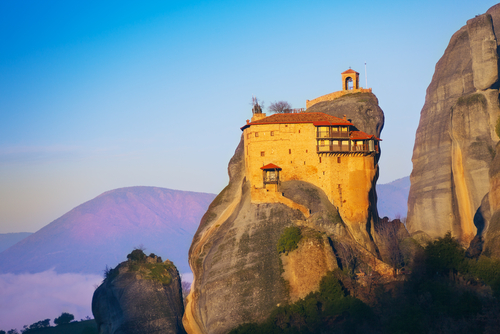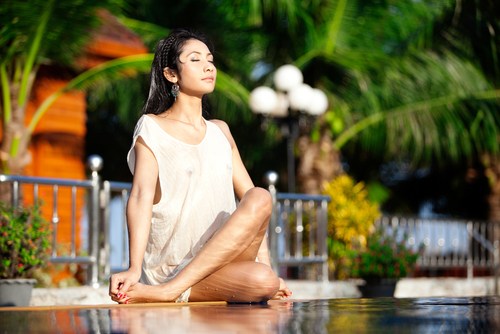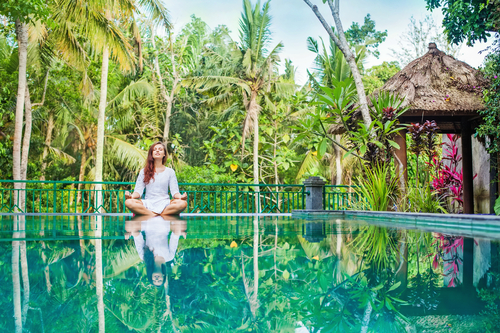Meditation Retreats

"Within you there is a stillness and a sanctuary to which you can retreat at any time and be yourself." Herman Hesse
Imagine having a week in an idyllic location with tuition and guidance from experts with no electronic devices, no worries, no stresses often with spas, infinity pools or delicious food. The perfect setting to take your meditation to a higher level. So many people report life-changing transformations after attending meditation retreats. Life-long friendships and close bonds are made amongst attendees of such retreats.
For links to the meditation retreats around the world, click here
5 essential questions to ask yourself before booking your first meditation retreat
1. Why am I doing it?
Seems a strange question to ask but it needs to be asked. Are you going for a holiday/break away from the stresses strains of everyday life? Well, you probably need to do your research on the meditation retreats very thoroughly because a lot of the meditation retreats are pretty full on and distinctly lacking in luxury. A lot of the Buddhist meditation retreats are Spartan when it comes to accommodation and you sleep on a piece of wood with a wooden pillow. You are typically getting up at 4am and lights are out at 9.30pm with no relaxation time. You are continuously meditating either sitting on a meditation cushion or prayer mat or in slow walking meditation. In some places like India or Thailand you are in the middle of the jungle and there are all of the jungle critters around you (snakes, scorpions, mosquitoes etc.) and there is no air-conditioning, soft mattresses and you can't read books or check your smart phone. So they are full on and involve considerable hardship. So do your research.
Having said that, many meditation retreats are ultra luxury (like the F**k It retreats in Italy) and you are doing meditation in the morning but have the rest of the day free to relax and get a sun tan. So you have to check your motivation and research the retreat so that you know what you are letting yourself in for. The correct motivation should be to be to learn how to meditate or meditate more effectively. You will come back with fresh insights and a new perspective on life but make sure you are prepared for the regime which is often very rigorous but not always.
2. What does it involve?
Do research the format of the meditation retreat? You need to be physically and mentally fit and able to cope with the rigours of meditation for hours on end. If the retreat is a silent retreat that means complete silence and you are not even allowed to communicate or attempt to communicate with fellow meditators. This is to take the pressure off you to communicate and socialise and to enable you to work on yourself. It is possible to send written notes to the teachers/organisers and sometimes this is done by way of a bulletin board. There is sometimes chanting as part of the day's activities in a lot of retreats but this is not the same as proper conversing. It might be a good idea to start with a day's retreat or a weekend retreat and build up to a one week, 10 day or 2 week retreat so that you can build your stamina and comfort levels.
3. How difficult is it going to be?
Well, for a novice, the meditation retreat might prove extremely difficult. You would have to factor in age, mental stamina, health and determination to succeed in a lot of the meditation retreats.
Another factor that surprises a lot of people is how difficult it is to remove all of the usual stimuli that we have in our lives now. We are bombarded by texts, emails, tweets and are used to having multiple electronic devices such as smart phones, tablets, PC's and in most retreats these are banned. You are not even allowed to bring a book. Many of the meditation retreats do not permit any contact with the outside world as this would seriously undermine the nature and discipline of the retreat. How will you cope? Of course, it is disturbing that we have evolved to such an extent that this is a serious consideration but you need to be aware of this and prepare yourself and also warn all of your family and loved ones. Some find that pre-written letters opened on each day of your absence are a good way to keep your loved ones happy.
If you have a back condition, you may well not be able to cope with hours sitting on a hard floor. The retreat may be able to accomodate this by allowing you to sit on a chair but many will not permit this.
If you go into the retreat with a cold or other virus, you may find the rigours of the retreat are too much as you may not be able to go loaded up with cold and flu remedies. So check and if in doubt, postpone.
Getting up at 4am or 5am may also be difficult for people who are not "morning people". I know it might sound trivial but it is worth mentioning.
At the end of the day, the key to success is to do you research and know what you are letting yourself in for.
The book below is a must read even if you are not contemplating a silent retreat.
For this in USA, you may find this link helpful:
Meditation Retreat HandbookFor those of you in the UK, you may find this link helpful:
Meditation Retreat Book4. What will I get out of it?
A wise man might say, what you will get out of a meditation retreat depends upon what you put it into it....
So what are the benefits you might expect to gain from attending a retreat?
Well, at the very least you might have a healthier respect for silence, for quietness, for shutting out the constant din and noise of living in the 21st Century. No devices, no emails, no Facebook, no Twitter for the length of the retreat. How will you survive? Very well, I would hazard to suggest. In fact, you may take away from the whole experience, the importance of giving yourself time to have a quiet think about your life.
You might end up discovering your life purpose and this could result in some very radical changes to your life when you return. You might realise you are wasting your life and need to focus on things that matter to you and to those around you. You might realise the benefits of a daily regime of meditation and reflection. You may stumble upon some realisations about the way you have been leading your life up to that point. The tensions and stresses which you consider normal, may become unacceptable post-retreat. You may need to conduct a thorough re-evaluation of your goals and even relationships. You may just return to normal life refreshed, renewed and re-invigorated. It would be good to be able to tap into those benefits in your daily life without the need to attend a retreat.
It may be the most significant thing you have ever done in your life. Well, that is the point really. What have you got to lose? A lot less than you stand to gain.
5. Does it need to be a silent retreat?
A large majority of meditation retreats are silent retreats and so you need to ask this question when deciding which retreat to choose. Silent retreats are very intense experiences. There is no hiding from yourself. You will have to confront those demons that have been lurking in your subconscious. You may have to do some forgiving of those that have wronged you or even forgive yourself for the errors of the past. The silence will bring all of these matters bubbling up.
The silence takes the pressure off having to indulge in small talk. It means if you are struggling (apart from written notes to the teachers/organisers), you will not be able to ask for help so you have to resolve a lot of things yourself and some may find this tough. It means no communication with loved ones and no communication with your business contacts. The latter may be a blessing but the former can be tough especially if you have young children. It may be the first time you have not had this daily interaction and contact.
However, it is within this stillness and quiet that the real jewels emerge. So many of the Eastern religions and philosophies emphasise the importance of this silence in order to still the endless chatter of our "monkey minds" as the Buddhists call it. It is the pure focus on breathing and being completely in the "now" that is the greatest joy of true mindfulness. Silence assists this.
Having said this, there are a vast number of meditation retreats that do not require silence and so you can have the benefits of interacting with others and opening yourself to others and their ideas.
So maybe the best solution is to try both as they will both bring benefits.

The Retreats
Below are links to meditation retreats in various parts of the world. Do let us know if you have been to a wonderful retreat which is not listed? The list of retreats will build with time and is by no means intended to be exhaustive.
Meditation Retreats: USA
Retreats: France
Retreats: Spain
Retreats: Africa
Retreats: India
Retreats: China
Retreats: Thailand
Retreats: Myanmar (Burma)
Retreats: Japan
Retreats: Italy
Retreats: UK
Retreats: Germany
Retreats: Austria
Retreats: Sweden
Retreats: South America

So what is your favourite meditation retreat?
Have you been to a retreat which you think is amazing, wonderful and that other people will love? Then share it with us here and I will write it up and include it in the list of retreats around the world.
What Other Visitors Have Said
Click below to see contributions from other visitors to this page...
The Secret Garden in Spain - Refocus and Quality time to yourself 




Hello all, I visited the Secret Garden retreat in Spain. In March 2015. It was better and more of all than I ever expected. It leaded me easily and with …

New! Comments
Have your say about what you just read! Leave me a comment in the box below.